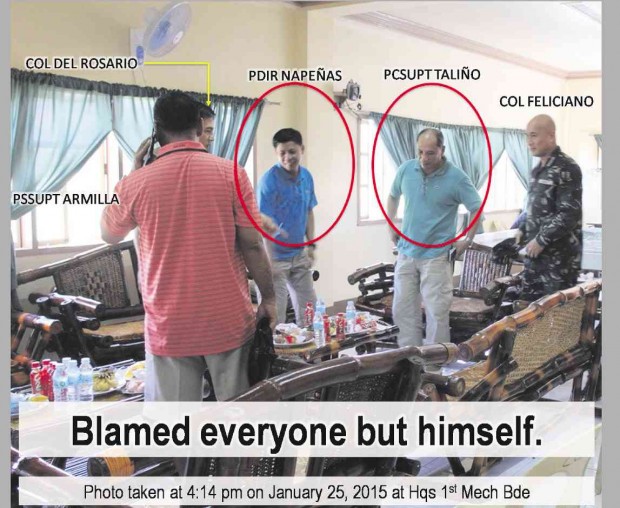AFP: Napeñas incompetent

THEN Director Getulio Napeñas, head of the Special Action Force, is shown in this photo released Wednesday by the Armed Forces of the Philippines at the continuation of the Senate inquiry into the Mamasapano debacle. Around that time, his men were already dead after a clash with Moro fighters. PHOTO COURTESY OF THE AFP
The reopening of the Senate inquiry into the Mamasapano fiasco a year ago turned into a day of the generals, who ganged up on Getulio Napeñas, the sacked commander of the Fallen 44 Special Action Force (SAF) commandos, and said his incompetence had led to the carnage.
The commanders of the Armed Forces of the Philippines had only harsh words for Napeñas and minced no words in blaming him for the debacle during the withdrawal phase of the operation.
“He is the kind of man who blames everyone but himself. He blamed the AFP. He even blamed the President. This mindset is the root of the problem that led to the debacle suffered by the SAF 44,” the former military operations chief, Maj. Gen. Angelo de Leon, concluded in a briefing he presented to the Senate committee on public order and dangerous drugs.
Napeñas said the military was kept in the dark about the SAF operation against Malaysian terrorist Zulkifli bin Hir, alias Marwan, because the AFP had been “compromised” and previous coordination did not pan out. He hinted about lack of confidence in the military’s ability to keep operations against “high-value targets” under wraps.
He said 10 operations had been aborted previously.
Article continues after this advertisementFifth call
Article continues after this advertisementDuring the hearing, the military, in its briefing, acknowledged five calls from SAF officials seeking artillery support for the besieged SAF troopers in Mamasapano on that tragic day.
According to De Leon, it was only by the fifth call around 5:35 p.m. that the required information from the SAF was completed.
The mandatory information, he explained, included the location coordinates of all friendly and enemy forces, the target description, established communication with troops requiring support, eyes on the ground, as well as details of the encounter.
Among factors he cited which affected the military’s support for Oplan Exodus, the operation to capture Marwan, were the redeployment of AFP men, causing forces to be thinly spread; the deliberate withholding of information about the operation; the absence of radio communications; and the use of different maps where the SAF used a Google map instead of a tactical map which made it difficult to find specific locations.
Smiling Napeñas
De Leon also pointed out in the briefing, showing a short video clip, that the SAF used a red private car as its tactical command center and that the unit had neither knowledge of the AFP’s call for fire procedure nor coordination.
In the presentation, the AFP attached a picture of a smiling Napeñas and three other SAF officers taken at 4:14 p.m. at the headquarters of the 1st Mechanized Infantry Brigade.
“Napeñas was detached from the reality of the SAF operation; unaware of the magnitude of SAF casualties; lacked a grasp of the gravity of the situation; had no intention to lead from the front; had a walk in the park mindset; and failed to exercise combat leadership,” De Leon said.
More trusted
For his part, Napeñas said the US-sourced intelligence was usually relayed to the SAF rather than the military.
When Sen. Ralph Recto asked him if the US forces’ Joint Task Force in Zamboanga City trusted the PNP-SAF more than the AFP, Napeñas simply said, “Why did they (Americans) give the intel to us? You can already conclude from that.”
Responsibility
Napeñas pointed out during the hearing that there were several joint operations with the military that fizzled out, including “Oplan Wolverine 1,” the reason that Oplan Exodus was kept under wraps until after it was put into motion.
Napeñas said the AFP could have sent artillery support in a matter of 30 minutes had Maj. Gen. Edmundo Pangilinan, commander of the Army 6th Infantry Division, not refused.
The SAF commander claimed that he and an American military officer, a certain Col. Eric Brown, were asking for reinforcements in the morning of Jan. 25, but Pangilinan only approved the deployment in the afternoon.
Sen. Francis Escudero observed, “Everyone had command but nobody wants to take responsibility.”